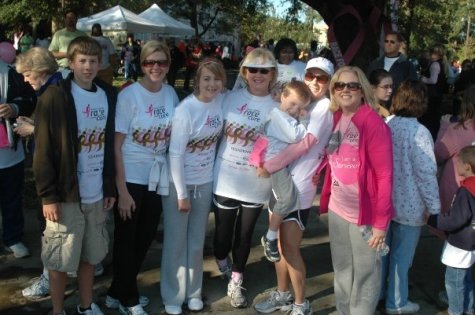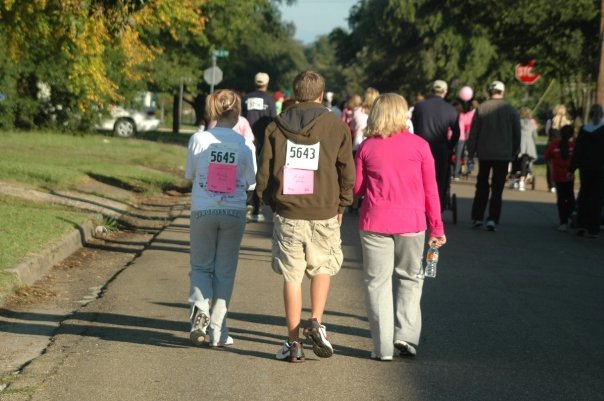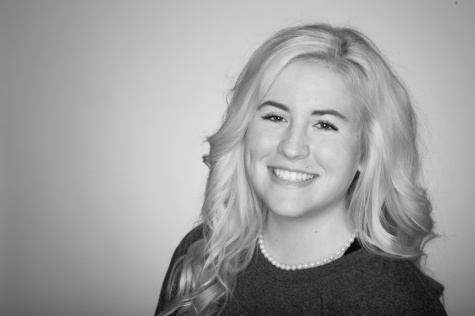Blindfolded
Senior Caroline Purtle describes her dance with a family disease
September 23, 2014
“It’s today.”
“It’s today.”
“It’s today.”
Not today. Not again. My eyes look out the window and see a landscape of the world, then the Black Cape of Coping draws a blind to the beauty. A time of balance is blindfolded in a moment of desolation. I know one day I will remove the curtain once more, and see the skies unfold and smiles reopen. I know one day the serenity will be reestablished. I know one day nature will flow its harmonic tunes in good health. But not today.
When we are 3, our parents and doctors teach us about the common cold and the curious case of the sinus infection. Ever so often we hear things like “high-blood pressure” or “arthritis.” When I was 5, I heard the word cancer. When I was 11, I heard the word cancer. I am now 17, and I hear it again. Oh, what does that mean? I know what it is, maybe not in the exact words, but I know it in emotion. I can write it down with memories.
The word laid its hand on my dad, my mother, one aunt, another aunt, my grandfather and my great grandmother. It’s been 17 years, and I feel it circling in on me, touching each person I love unconditionally. I’m 17-years-old and I have witnessed the word dance with six family members. It always begins with a slow waltz, two tangos, then the lights dim and you hear the applause of 1,000 angels in the balcony.
They roll out from surgery, clothed in the humblest of all gowns, like sleeping beauty. Each awoke with good news and stripped the mask the disease let them borrow. It was a day they saw the world for who she is. Stripped down, cut open, beat up, and they were incandescently happy.
Who knew the word could change so much. It can bring the softest sorrow and the sweetest tears. It will deliver the most love and the greatest bonds. I’m in no way thanking the word, I just wish a certain paradise could be obtained less aggressively. The word is a killer. It’s the unbiased reaper to many. It floats from house to house, seeking the weak.
I know I’m not the one to live through the countless surgeries and check-ups. I have to stand beside them, hold their hand, portray a seamless smile– be strong when they can’t. I tell them it’s going to be all right and make promises that I can’t keep. I cry the tears they never see. It’s a word, but I have to accept that it’s a disease. If it’s one thing I have to remind myself it’s that hope is a dangerous thing. Every tormented face, I just wish it was me.
I remember seeing my dad in the hospital when I was 5, bringing tidings of joy and the unwanted Halloween candy of caramel and nuts in my plastic purple bucket. The bucket was so heavy I could barely carry it. I remember him in the bed, lights nearly off, in a sadness that was so unusual to me. It wasn’t until a few days later that I found out he couldn’t have candy for while, and as a child that was something incomprehensible and positively absurd. I guess you could say I hated cancer from the beginning.
About six years after that, “It’s today,” they told me. I slipped on my St. James yellow collared shirt, buttoned my khaki skort, fastened the navy blue rubber Nina shoes and grabbed the pink ribbon and pinned it on. It had a rose in the center. I was smiling all day, like my mom was already ridden from the blight.
I remember the chemo. I remember the day she shaved her head, and I ignorantly said I didn’t like it. And who could forget the road trips to Houston every three weeks. My fondest memory during that time was being stacked-up with my family in my parent’s hotel room, watching The Soup and the women’s beach volleyball team winning it all in the Olympics. After chemo and radiation, my mom wore wigs for a while. I would steal them in envy and try them on. I never looked as good in them as she did. She was beautiful.
Years later, I’m now texting my grandfather “get well” messages, and visiting my great grandmother who barely has enough strength to speak. I hear their pain and see their pain, and I plan to one day feel it.
If I met the word, I would scream. I would fall to my hands and knees. I would ask why, and it would reply, “I’m a disease.” I know there is no explanation. I have to accept the injustice. I have to. I wake up and sometimes I can’t tolerate that fact. I will scream. I will fall to my hands and knees. I will ask why, and wait for a reply. But I will hear my own silence. I will hear my denial loudly with the lack of syllables. Then I will stand up, and I have to accept the injustice, forever.
Colon, breast, ovarian, cervical, prostate and leukemia. They are all words too. Those words were family once. What’s next? Bliss, ecstasy, euphoria? Maybe not everyone gets the Hollywood Ending of the clouds peeking through and birds chirping. There’s always another chapter. Another blindfold. Another time of personal rapture. Another darkness. So the word waits, watching for the sun’s escape, but what the darkness doesn’t know is that there will always be another day.
















Taylor Potter • Sep 23, 2014 at 9:12 pm
This is one of the greatest stories that has been put on this website. I showed this to my honors Intro to Media professor, and he absolutely loved it. There isn’t anything that could be done to it to make it any better.
I also know that this took a lot of work and toughness to put into words. Thank you for sharing it. You’re absolutely incredible.
Madeleine Russell • Sep 23, 2014 at 1:24 pm
This little comment box says to “Speak your mind” but no words of mine can give this story justice. I have sent it to all my friends here at A&M and they have all messaged me back saying they are crying in the middle of class and this story is so beautifully written. It has definitely left an impact on me and I encourage every one to read it and share it with others.